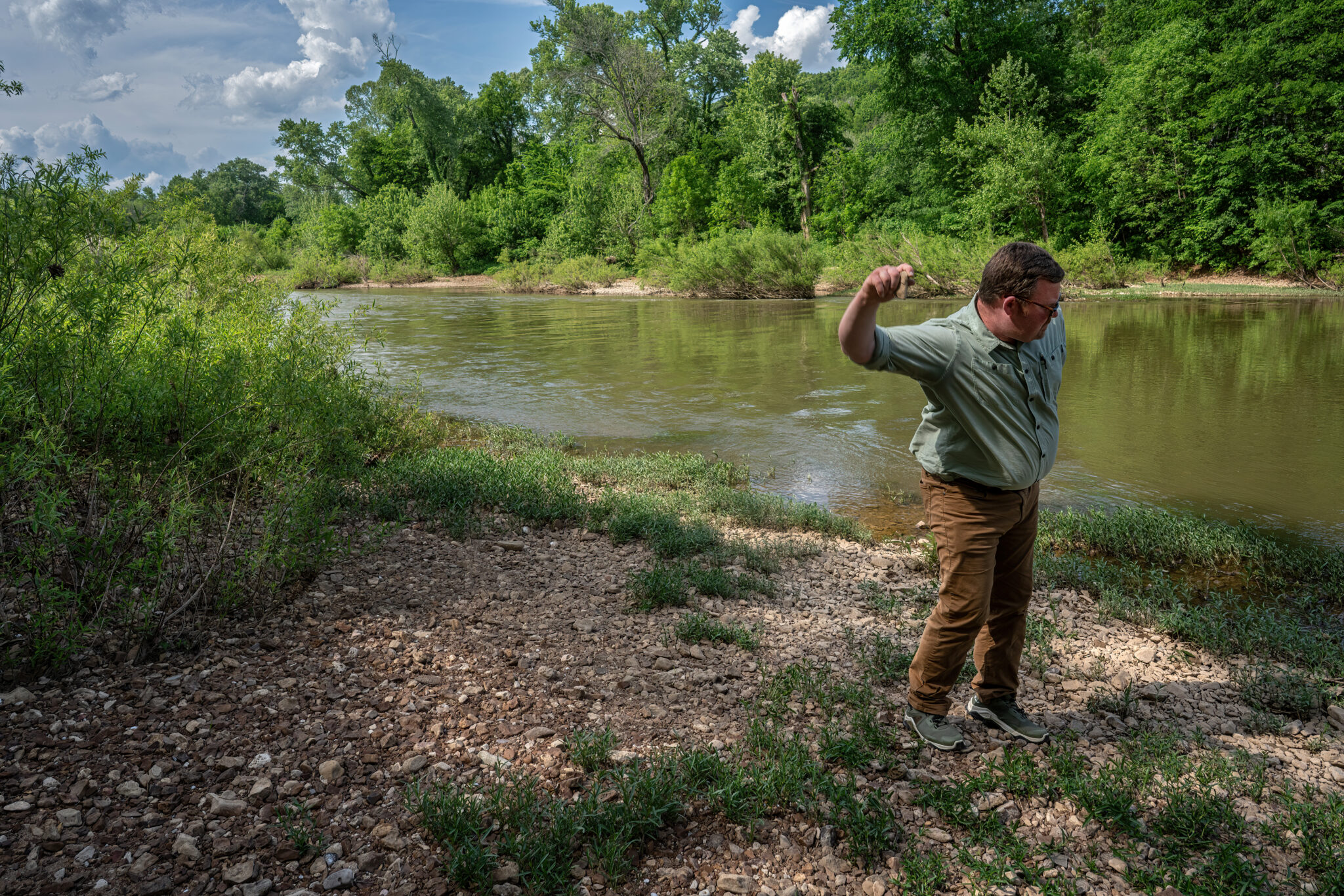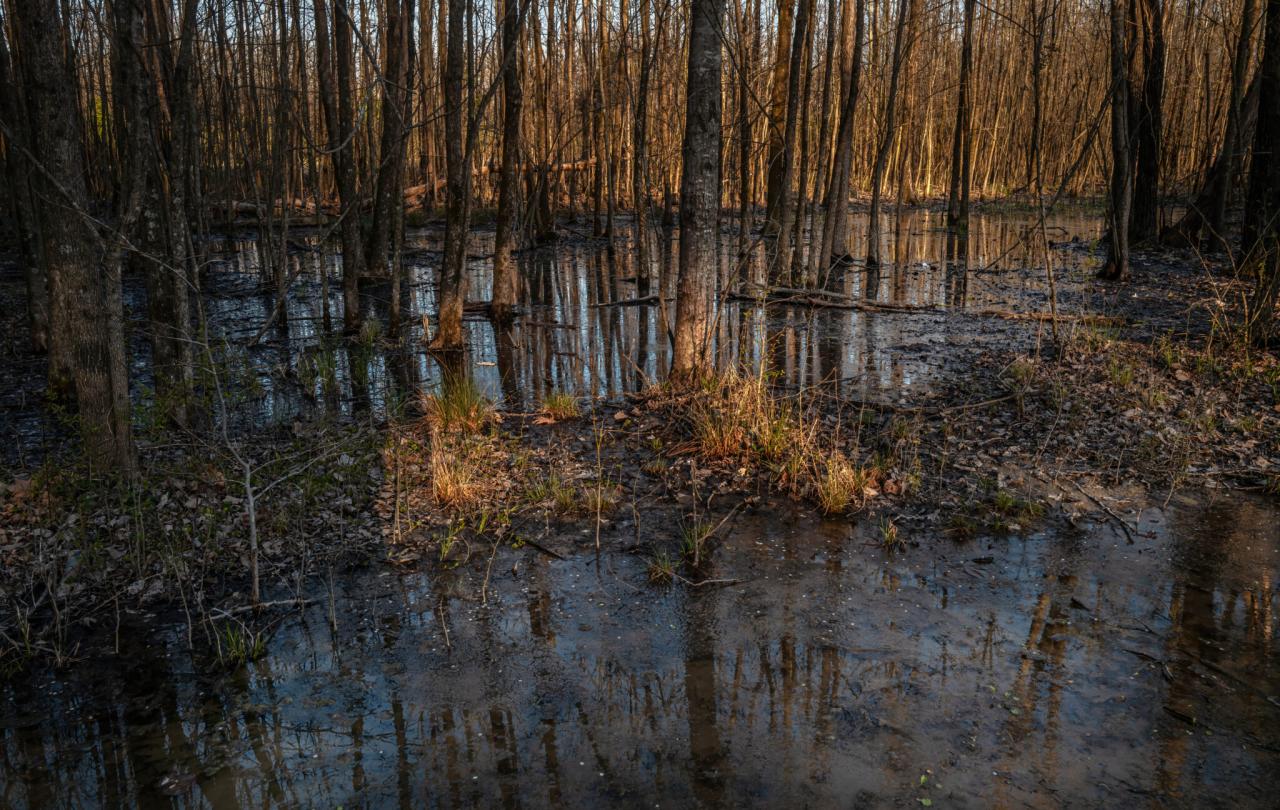Anita Wadhwani
Helene: After weeks of dredging, CSX receives stop-work order on Nolichucky Gorge railroad destroyed by tropical storm

Company accused of illegally mining river rocks, sediment to shore up rail lines washed out by Helene
This story was originally published by Tennessee Lookout.
ERWIN — The U.S. Army Corps of Engineers and Tennessee environmental regulators ordered CSX Transportation to stop dredging the Nolichucky River Gorge for rocks and sediment being used to shore up a rail line washed away by Tropical Storm Helene.
In separate letters issued to the Fortune 500 company this month, the Corps and the Tennessee Department of Environment and Conservation (TDEC) warned, the company’s dredging was unauthorized — and noted CSX had continued dredging activities even after being put on notice last month by both agencies.
The company is prohibited from performing “any excavation or dredging of material from the Nolichucky River or its tributaries in both Tennessee and North Carolina, the Dec. 2 letter from the Corps said. CSX must “immediately cease and desist” its dredging, TDEC’s Dec. 6 letter said.
Dredging poses serious risks to the river’s aquatic life and increases the potential of downstream flooding in the future for communities that rely on the Nolichucky for outdoor recreation and the tourist dollars it brings in, a lawsuit filed by lawyers with the Southern Environmental Law Center said last month.
Helene: Governor faces pushback after using Tenncare money for disaster relief
 In East Tennessee on Tuesday, Gov. Bill Lee viewed a buckled road damaged by the aftermath of Hurricane Helene. Brandon Hull/Office of the Governor via Tennessee Lookout
In East Tennessee on Tuesday, Gov. Bill Lee viewed a buckled road damaged by the aftermath of Hurricane Helene. Brandon Hull/Office of the Governor via Tennessee Lookout
National health care groups warned in 2022 that the unusual Tenncare fund now being used for disaster relief would redirect dollars away from low-income enrollees
Anita Wadhwani is a senior reporter for Tennessee Lookout.
NASHVILLE — In the days after Hurricane Helene unleashed catastrophic floods across parts of East Tennessee — killing 17 and inflicting hundreds of millions of dollars in damage — Gov. Bill Lee convened a series of conference calls with his cabinet members to urge his team to “think outside the box” in how to get desperately needed capital to hard-hit rural counties.
TennCare Director Stephen Smith offered up a novel idea: tap into a special savings pool within Tennessee’s Medicaid program, which draws on a combination of state and federal funds to pay the health care bills for 1.5 million Tennesseans living in or near poverty — among them pregnant women, children, seniors and those with disabilities.
Lee, who later recounted the conversation at a news conference, went with it.
The Helene Emergency Assistance Loans (HEAL) program will direct $100 million in no-interest loans from TennCare to 13 disaster-struck Tennessee counties, tapping so-called “shared savings” funds that are unique to the state’s Medicaid program.
Water supply demands could strain Duck River’s rare riverine habitat
 John McEwan, whose family has lived on the banks of the Duck River since the 1860s, skips stones on the Duck River. Environmental groups fear excessive demand is fueling drawdowns that are affecting the rich biodiversity of the Middle Tennessee river.&nsp; Tennessee Lookout/John Partipilo
John McEwan, whose family has lived on the banks of the Duck River since the 1860s, skips stones on the Duck River. Environmental groups fear excessive demand is fueling drawdowns that are affecting the rich biodiversity of the Middle Tennessee river.&nsp; Tennessee Lookout/John Partipilo
Long time residents and conservation groups say industry lured by the state, population growth are draining water from a river prized for its biodiversity
This story was originally published by Tennessee Lookout.
COLUMBIA — When Gov. Bill Lee announced the state had lured a General Motors lithium battery supplier to Spring Hill three years ago, it was his largest economic announcement to date:
A $2.6 billion corporate investment; 1,300 new jobs; a major stepstone along Tennessee’s path to become an EV hub — helped along by a then-record $46,000 per job in taxpayer incentives.
The factory deal’s less conspicuous specs — its continuous need for 1.4 million gallons of water per day — is now figuring in a larger battle pitting citizens and conservation groups against state environmental regulators.
Last month, the Tennessee Department of Environment and Conservation (TDEC) granted permission to Columbia Power and Water Systems — which pumps water to the new Ultium Cells plant — to increase its current withdrawals from the Duck River by 60 percent.
It’s one of eight water companies along the Duck River seeking to dramatically increase water draws to meet rising demands for water in the rapidly growing five-county region southwest of Nashville.
- duck river
- duck river biodiversity
- tennessee lookout
- middle tennessee environment
- lithium batteries
- gov bill lee environment
- john mcewan
- hickman for the duck
- ultium cells plant water use
- doug jones duck river
- anita wadhwani
- water demand
- water supply
- economic growth
- general motors
- southern environmental law center
- tennessee department of environment and conservation
- tdec
- columbia power and water systems
- spring hill, tn
- george nolan
Appeals court: Wildlife officers’ warrantless searches of private property are unconstitutional
 Hunter Hollingsworth, at his family’s Benton County property, successfully sued the Tennessee Wildlife Resources Agency over unwarrantless searches of his property. An appellate court upheld a lower court ruling against the agency. John Partipilo/Tennessee Lookout
Hunter Hollingsworth, at his family’s Benton County property, successfully sued the Tennessee Wildlife Resources Agency over unwarrantless searches of his property. An appellate court upheld a lower court ruling against the agency. John Partipilo/Tennessee Lookout
This story was originally published by Tennessee Lookout.
In a blistering and unanimous opinion, the judges called TWRA’s legal defense of its tactics a “disturbing assertion of power on behalf of government.”
NASHVILLE — State game wardens cannot enter private property in Tennessee without a warrant, the state’s Court of Appeals ruled last week.
The decision puts in check a unique power wielded for decades by the Tennessee Wildlife Resources Agency to secretly patrol and surveil Tennesseans’ privately-owned lands for potential violations of hunting, fishing and wildlife laws.
TWRA officers don’t seek permission from a judge before entering private property, need no supervisor approval, keep no records of their searches and don’t inform property owners — sometimes donning camouflage or installing cameras to secretly monitor activities based on the suspicions of an individual officer.
The blistering and unanimous opinion by a three-judge panel compared TWRA’s tactics to British customs officials who were granted unlimited “writs” by the king of England to conduct arbitrary searches in the years leading to the Revolutionary War — abusive actions that would go on to inform the establishment of the U.S. Constitution’s 4th Amendment protecting Americans from illegal government searches and seizures.
- twra
- twra abuses
- twra warrantless searches
- tennessee court of appeals
- 4th amendment
- colonial boston
- tennessee constitution
- search protections
- article 1, section 7 of the tennessee constitution
- twra property rights
- terry rainwaters tennessee
- emily buck twra
- hunter hollingsworth
- institute for justice
- joshua windham
- tennessee lookout
- anita wadhwani
Tennessee’s mighty Duck River is gravely imperiled
 A view of the Duck River, Tennessee longest river, from Old Stone Fort in Manchester. John Partipilo/Tennessee Lookout
A view of the Duck River, Tennessee longest river, from Old Stone Fort in Manchester. John Partipilo/Tennessee Lookout
The Duck landed third on American Rivers’ list of most endangered rivers in the U.S.
This story was originally published by Tennessee Lookout.
COLUMBIA — The Duck River, which winds through seven Middle Tennessee counties for more than 260 miles before reaching the Tennessee River, is among the most endangered rivers in the United States, according to a new report by the advocacy group American Rivers.
Threatened by population growth, development and climate change “urgent action is needed to safeguard this vital ecosystem,” the report released Tuesday said.
The Duck River serves as the source of drinking water for nearly 250,000 Tennesseans. Industry and agriculture depend on it, too. Often considered one of Tennessee’s most pristine waterways, it draws more than 150,000 people each year for boating, fishing and other recreation. Last year, in an effort to protect the river from a controversial plan to establish a landfill near its banks, state lawmakers designated a portion of the river in Maury County an official state scenic waterway.
Bill to allow development on Tennessee wetlands advances in House; supporters cite property rights
 Wetlands in Shelby Bottom in Nashville. Legislative efforts are underway to undermine state regulatory authority of the important ecosystems. John Partipilo
Wetlands in Shelby Bottom in Nashville. Legislative efforts are underway to undermine state regulatory authority of the important ecosystems. John Partipilo
West Tennessee legislation appears to be driven by powerful development interests
This article was originally published by Tennessee Lookout.
NASHVILLE — A controversial bill to claw back state regulations over thousands of acres of Tennessee wetlands advanced with no debate in a House committee, keeping the proposal alive even after it was shelved in the state senate. The bill is likely to be considered this week in another subcommittee.
The bill would give developers and landowners a break from needing state permission to build on or fill in wetlands that have no obvious surface connection to a river, lake or stream. Current law gives the Tennessee Department of Environment and Conservation, or TDEC, the power to approve or deny plans to disturb a wetland — and to require that developers pay often-costly mitigation fees if a project is allowed to go forward.
The bill’s sponsors, west Tennessee Republicans Rep. Kevin Vaughan and Sen. Brent Taylor, have called state rules onerous and an infringement on the rights of property owners.
Former Tennessee Wildlife and Resources Agency biologist alleges agency manipulated data on deer disease
 A Tennessee deer with Chronic Wasting Disease. Tennessee Wildlife Federation
A Tennessee deer with Chronic Wasting Disease. Tennessee Wildlife Federation
In a lawsuit filed against the agency, the former employee claims officials misled the public about the rate of a neurological disorder in deer, changing protocols to avoid admitting mistakes.
This story was originally published by Tennessee Lookout.
NASHVILLE — A former state biologist claims he was confronted in his home by law enforcement officers with the Tennessee Wildlife Resources Agency on the same day he sent his boss’s superiors evidence the state was falsifying data on wildlife diseases.
After his cell phone, laptops and other items were confiscated, the biologist said he was then subjected to hours of questioning by officers — among them the husband of his immediate supervisor.
James Kelly (video link features Kelly at 10 minutes), a wildlife biologist, led the Tennessee Wildlife Resources Agency’s deer management program, chaired the agency’s Chronic Wasting Disease (CWD) Deer Management Standing Team and served as a wildlife biologist until he was fired in 2022.
In a whistleblower lawsuit filed this week, Kelly alleges state officials manipulated data and misled the public about the prevalence of chronic wasting disease, a fatal and infectious disease that attacks deer populations.
(TWRA would not comment on the specific allegations in the filing, but said its data was solid).
Southern enviros again take aim at budding TVA strategy to replace coal with fossil gas
 Warnings posted in Dickson County near Tennessee Gas Pipeline property. John Partipilo/Courtesy Tennessee Lookout
Warnings posted in Dickson County near Tennessee Gas Pipeline property. John Partipilo/Courtesy Tennessee Lookout
Environmental groups sue Tennessee Valley Authority over proposed new power plant
This story was originally published by Tennessee Lookout.
NASHVILLE — A trio of environmental groups filed suit against the Tennessee Valley Authority, claiming the utility violated federal law by failing to properly evaluate climate, environmental and financial impacts of a proposed new gas-fired plant in Cumberland City, Tennessee.
The lawsuit, filed in a Nashville federal court this month, also claims that TVA quietly inked a deal with an international pipeline company to supply the gas-fired plant, even as it publicly went through the motions of seeking input on alternative sources of power to replace the Cumberland Fossil Plant, its aging coal-fire facility located about 60 miles northwest of Nashville.
The groups are seeking an immediate halt to construction on the gas plant and an order forcing the utility to revise the existing environmental impact study used as the basis for moving forward with the gas-fired plant.
“Our country’s largest utility has gamed the system to fast-track dirty energy projects and that’s why we’re going to court to stop it,” Gaby Sarri-Tobar, a campaigner with the Center for Biological Diversity, said in a statement. “TVA needs to be held accountable for its reckless pursuit of a new fossil gas plant in the midst of the climate emergency.”
‘Egregious’ abuse of power: Judge slams TWRA falcon seizure and owner’s prosecution
 Lamar bestows a kiss on one of her raptors. John Partipilo via Tennessee Lookout
Lamar bestows a kiss on one of her raptors. John Partipilo via Tennessee Lookout
Judge rules that Tennessee Wildlife Resources Agency grossly overstepped its bounds following citizen complaint
This story was originally published by Tennessee Lookout.
NASHVILLE — Holly Lamar, a master falconer and owner of a Nashville “bird experience” business, has a story to tell about each one of her 13 captive-bred birds of prey.
The story behind Faith, a 7-year-old peregrine falcon, is tied to a particularly rough patch for Lamar, who experienced success as a Grammy-nominated songwriter, then lost nearly everything. The 20-day-old chick arrived just after Lamar fell victim to a financial scam that wiped out earnings from her music career.
She picked the name “Faith” to symbolize the feelings of trust she was trying to regain in her life — and as a nod to Faith Hill, the country singer who recorded “Breathe,” a 1999 megahit co-written by Lamar.
Faith, the falcon, is now dead — one of 13 falcons seized by officers with the Tennessee Wildlife Resources Agency in a sweeping August search of Lamar’s home and property that a Nashville judge later characterized as “egregious,” an “abuse of the law” and a violation of Lamar’s constitutional rights.
‘I remember the marks in his ankle:’ Paddlers push for trotline regulations on Tennessee waterways
 Silver weight and thin fishing line tied to a branch for an underwater trotline. Getty Images via Tennessee Lookout
Silver weight and thin fishing line tied to a branch for an underwater trotline. Getty Images via Tennessee Lookout
Traditional Tennessee trot lines pose a fatal collision with river recreation
This story was originally published by Tennessee Lookout.
NASHVILLE — Brandon Archer was canoeing down the Buffalo River with friends over Labor Day weekend three years ago when he jumped out for a swim and drowned.
Archer had become entangled in a trotline, an unmanned fishing line studded with hooks that stretched across the river. The MTSU football player died a day shy of his 22nd birthday.
“When they found him he was under 10 feet of water and they found trotline wrapped around his ankle,” Courtney Archer, Brandon’s mother, told members of the Tennessee Fish and Wildlife Commission this month. “When I saw my son I remember the marks in his ankle from the trotline that was there.”